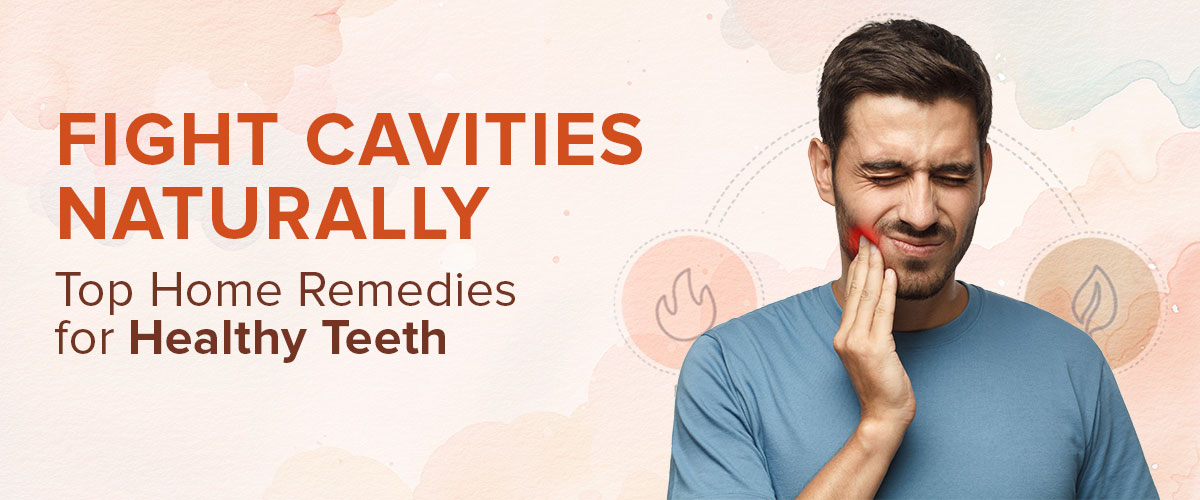Home Remedies for Tooth Cavity

Tooth cavities are among the most prevalent health issues worldwide. In fact, the World Health Organisation states that nearly all adults experience one dental cavity at some point in their lifetime. Cavities could lead to discomfort and pain in addition to serious dental issues, including infections and tooth loss if left untreated. Cavities impact more than your teeth. They might impact your ability to eat and speak & your confidence.
Considering the prevalence and effect of tooth cavities, it is not surprising that most people prefer home remedies as the first line of defense. These natural solutions can help you manage the first symptoms of cavities and are easy to prepare at your own house. Using ingredients in your fridge or pantry, you can easily improve your oral hygiene and prevent tooth cavities.
What is Tooth Cavity?
A tooth cavity or simply a cavity is tooth decay where certain bacteria produce acid which damages the enamel of a tooth and its supporting layer, the dentin. This process starts when food remains on the teeth (especially starches and sugars). Bacteria in the mouth feed upon these food particles and form acids. Ultimately, these acids create a small hole in the tooth which can become bigger and deeper if untreated.
The symptoms of a tooth cavity can depend upon the extent and place of the decay. In the beginning, you might have no symptoms. However the cavity is more likely to grow and cause tooth sensitivity, mild to sharp pain whenever you eat or drink something sweet, cold or hot, visible holes or pits in your teeth, brown, black, or gray staining on any surface area of a tooth, and pain whenever you bite down.
What Causes Tooth Cavity?
From diet choices to oral hygiene practices, tooth cavities result from a mix of factors impacting dental health. Knowing these causes might help avoid and manage cavities and help keep healthy teeth.
The leading causes of teeth cavities are given below :
Poor Oral Hygiene: Not brushing or flossing frequently creates plaque on teeth surfaces, along gum lines, and between teeth. Plaque contains bacteria that feed on food particles and produce acids that cause decay.
Sugary & Starchy Foods: Foods loaded with sugar and starches are usually cavity forming. They include desserts and candies, soft drinks & white bread. In the mouth, bacteria consume the sugar and form acids which destroy the enamel.
Frequent Snacking: Eating often during the day, particularly snacking on acidic or sugary snacks, could be a continuous supply of food for the bacteria in the mouth, causing increased cavity risk.
Plaque Formation: Plaque is a sticky film of food debris, bacteria and saliva. In case plaque isn't taken out regularly, it might mineralise into tartar, which is tougher to remove and causes more serious tooth decay.
Dry Mouth: Saliva washes away food and neutralises acids created by microorganisms in the mouth to avoid decay. A dry mouth contains much less saliva and more cavities.
Worn Fillings/Dental Devices: Over time, dental fillings and devices weaken, break down, or get rough edges. This enables plaque to collect and is harder to clean up.
Young or Old Age: In young children, poor dental hygiene and high sugar diets increase cavity risk. In older adults, ageing enamel wear and tear and receding gums expose firmer root tissue to plaque.
Resolving these factors might lower the danger of cavities and promote good oral health on the whole.
Home Remedies and Tips
Start addressing tooth cavities today with easy, natural remedies for prevention and maintenance of excellent oral health at home. Below are some simple home remedies for tooth cavity to incorporate in your routine:
Oil Pulling: An ancient technique to thoroughly clean the teeth, oil pulling requires swishing oil like sesame or coconut oil in your mouth for 2-5 minutes just before brushing. This eliminates dangerous bacteria and plaque. Begin your day by oil pulling on an empty stomach.
Clove Oil: Clove oil is used for treating cavities and toothache because of its pain relieving properties. Put a little clove oil on a cotton ball and press it against the infected tooth for quick relief. For a less concentrated preparation, dissolve clove oil in a carrier oil like coconut oil & start using it as a mouthwash.
Neem: Use neem for its antibacterial properties in neem toothpaste or create a mouthwash from boiled neem leaves. Rinse your mouth with the neem solution after brushing to kill bacteria and freshen your breath to stop cavity development.
Aloe Vera: Aloe vera gel soothes and fights bacteria in the mouth. Put on the gel on your gums and teeth, let it sit for a few minutes then rinse. This could reduce gum inflammation and prevent conditions which cause cavities.
Garlic: Garlic possesses antimicrobial properties which could destroy the bacteria that lead to cavities. Grind a garlic clove, blend with some salt and apply the paste on the affected tooth. This could ease pain and stop bacterial growth.
Saltwater Rinse: Rinsing with saltwater is an easy yet effective home remedy. Dissolve 1 / 2 teaspoon of salt in a cup of hot water and rinse your mouth two times daily. This neutralises mouth acids and kills bacteria to promote healing of tooth cavities.
Turmeric: Its antimicrobial and antibacterial qualities make turmeric good for oral treatment. Blend turmeric powder and water to create a paste & apply it in your teeth. Allow it to remain for some time & then rinse it off. This can help reduce inflammation and stop bacteria which cause cavities.
Guava Leaves: Take some fresh guava leaves to chew or use them to make a mouth rinse. The antimicrobial properties of the leaves destroy cavity-causing bacteria and soothe inflamed gums.
Lifestyle and Diet Recommendations
Good lifestyle and smart diet choices can help with the prevention and management of tooth cavities. Practical tips & suggestions for keeping your teeth healthy include:
Restrict Sugary Foods & Drinks: In your mouth, bacteria thrive on sugar to produce acids that weaken the enamel and produce cavities. Cut back on sugary snack foods, beverages and desserts. Instead, select healthier options like fruits and vegetables that don't stick to your teeth.
Consume Foods High in Calcium & Phosphates: Dairy products (milk, yogurt and cheese), almonds, leafy greens, & seafood supply nutrients which remineralise teeth enamel. These foods are nutritious and help strengthen your teeth from within.
Increase Water Intake: Drinking a lot of water throughout the day washes food particles and bacteria from your teeth, decreasing the chance of cavities. Additionally, it helps maintain a proper flow of saliva, which is essential for dental health.
Chew Sugar Free Gum: Chewing sugar free gum after meals might stimulate saliva production to cleanse the teeth and gums and neutralise acids created by bacteria in your mouth.
Routine Oral Hygiene: Brush a minimum of two times daily with fluoride toothpaste and also floss daily. This stops plaque buildup and the formation of cavities in the teeth. Regular cleanings and check-ups are also required for oral health.
Avoid Regular Snacking: Keep snacking to a minimum. Frequent snacking, especially on acidic or sugary food, offers bacteria more opportunities to thrive in your mouth & produce acids that attack your teeth & weaken your enamel.



 Prev
Prev

































































